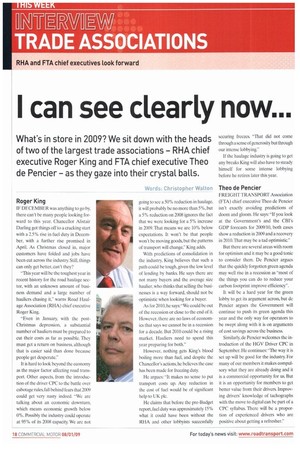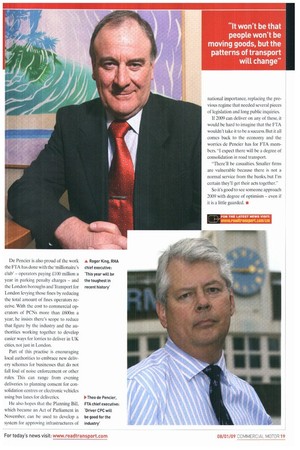I can see clearly now...
Page 18

Page 19

If you've noticed an error in this article please click here to report it so we can fix it.
What's in store in 2009? We sit down with the heads of two of the largest trade associations RHA chief executive Roger King and FTA chief executive Theo de Pencier as they gaze into their crystal. balls.
Words: Christopher Walton Roger King IF DEO BER was anything to go by, there can't be many people looking forward to this year. Chancellor Alistair Darling got things off to a cracking start with a 2.5% rise in fuel duty in December, with a further rise promised in April. As Christmas closed in, major customers have folded and jobs have been cut across the industry. Still, things can only get better, can't they?
"This year will be the toughest year in recent history for the road haulage sector, with an unknown amount of business demand and a large number of hauliers chasing it," warns Road Haulage Association (RHA) chief executive Roger King.
"Even in January, with the postChristmas depression, a substantial number of hauliers must be prepared to cut their costs as far as possible. They must get a return on business, although that is easier said than done because people get desperate."
It is hard to look beyond the economy as the major factor affecting road transport. Other aspects, from the introduction of the driver CPC to the battle over cabotage rules, fall behind fears that 2009 could get very nasty indeed. -We are talking about an economic downturn, which means economic growth below 0%. Possibly the industry could operate at 95% of its 2008 capacity. We are not going to see a 50% reduction in haulage, it will probably be no more than 5%, but a 5% reduction on 2008 ignores the fact that we were looking for a 5% increase in 2009. That means we are 10% below expectations. It won't be that people won't be moving goods, but the patterns of transport will change," King adds.
With predictions of consolidation in the industry, King believes that such a path could be tough, given the low level of lending by banks. He says there are not many buyers and the average size haulier, who thinks that selling the businesses is a way forward, should not be optimistic when looking for a buyer.
As for 2010, he says: "We could be out of the recession or close to the end of it. However, there are no laws of economics that says we cannot be in a recession for a decade. But 2010 could be a rising market. Hauliers need to spend this year preparing for both."
However, nothing gets King's blood boiling more than fuel, and despite the Chancellor's actions, he believes the case has been made for freezing duty.
He argues: "It makes no sense to put transport costs up. Any reduction in the cost of fuel would be of significant help to UK plc.
He claims that before the pre-Budget report, fuel duty was approximately 15% what it could have been without the RHA and other lobbyists successfully securing freezes. "That did not come through a sense of generosity but through our intense lobbying."
If the haulage industry is going to get any breaks King will also have to steady himself for some intense lobbying before he retires later this year.
Theo de Pencier
FREIGHT TRANSPORT Association (FTA) chief executive Theo de Pencier isn't exactly avoiding predictions of doom and gloom. He says: -If you look at the Government's and the CBI's GDP forecasts for 2009/10, both cases show a reduction in 2009 and a recovery in 2010. That may be a tad optimistic.
But there are several areas with room for optimism and it may be a good tonic to consider them. De Pencier argues that the quickly forgotten green agenda may well rise in a recession as "most of the things you can do to reduce your carbon footprint improve efficiency".
It will be a hard year for the green lobby to get its argument across, but de Pencier argues the Government will continue to push its green agenda this year and the only way for operators to be swept along with it is on arguments of cost savings across the business.
Similarly, de Pencier welcomes the introduction of the HGV Driver CPC in September. He continues: "The way it is set up will be good for the industry. For many of our members it makes compulsory what they are already doing and it is a commercial opportunity for us. But it is an opportunity for members to get better value from their drivers. Improving drivers' knowledge of tachographs with the move to digital can he part of a CPC syllabus. There will be a proportion of experienced drivers who are positive about getting a refresher." De Pencier is also proud of the work the FTA has done with the 'millionaire's club' — operators paying £100 million a year in parking penalty charges — and the London boroughs and Transport for London levying those fines by reducing the total amount of fines operators receive. With the cost to commercial operators of PCNs more than £600m year, he insists there's scope to reduce that figure by the industry and the authorities working together to develop easier ways for lorries to deliver in UK cities, not just in London.
Part of this practise is encouraging local authorities to embrace new delivery schemes for businesses that do not fall foul of noise enforcement or other rules. This can range from evening deliveries to planning consent for consolidation centres or electronic vehicles using bus lanes for deliveries.
He also hopes that the Planning Bill, which became an Act of Parliament in November, can be used to develop a system for approving infrastructures of national importance, replacing the previous regime that needed several pieces of legislation and long public inquiries.
If 2009 can deliver on any of these, it would be hard to imagine that the FTA wouldn't take it to be a success. But it all comes back to the economy and the worries de Pencier has for FTA members. "I expect there will be a degree of consolidation in road transport.
"There'll be casualties. Smaller firms are vulnerable because there is not a normal service from the banks, but I'm certain they'll get their acts together."
So it's good to see someone approach 2009 with degree of optimism — even if it is a little guarded. •








































































































































